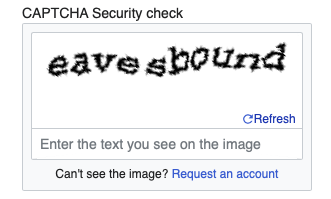CAPTCHA
CAPTCHAs are designed around the limitations of current artificial intelligence, which struggle with particular tasks that humans generally have no difficulty with. However, as artificial intelligence technology progresses, new programs are often able to reliably evade existing security measures. Computer scientists view this as a win-win—either a CAPTCHA version cannot be defeated and a site remains secure, or the program employed to evade the existing CAPTCHA has successfully solved an open problem in artificial intelligence and significantly advanced the field.[1][2] Regardless, CAPTCHAs themselves must continually evolve in order to remain a step ahead of malicious programs, which has led to the propagation of new challenge systems, such as reCAPTCHA, hCAPTCHA, and ASIRRA.
CAPTCHA and its successors have been criticized for presenting a barrier to web accessibility and generating undue challenges for users with disabilities or atypical skill and knowledge sets. Such users, in addition to potentially lacking abilities presumptively possessed by the human user audience, often actively utilize technology to enable or supplement their online experiences (e.g., screen reading or speech recognition software.) Their assistive devices, being programs, are by design regularly unable to appropriately interpret or bypass certain CAPTCHAs in order to verify personhood and access the site.
Contents
Background
For example, humans typically outperform computers on image recognition tasks, especially those that require manipulation or categorization.
Evolution of Programs
Turing Test
Reverse Turing Test
Level 2
Level 2
Web Accessibility Concerns
social and cultural disparities (e.g., unfamiliarity with American traffic lights) legality? (e.g., internet inexperience, social access disparities, and/or different cultural backgrounds)
presumption of experience
age
disabilities
Artificial Intelligence Progress
Computer Evasion
Use to Train Programs
Timeline and Versions
original versions still in use btw
CAPTCHA
text
reCAPTCHA
reCAPTCHA is a notable CAPTCHA service and company originally affiliated with Carnegie Mellon University's School of Computer Science.[7][8] Luis von Ahn, who was a part of the original CAPTCHA team in 2000, is credited as the project’s executive producer.[1][8] The project is the original team’s officially recommended CAPTCHA iteration.[1]
macarthur grant??
Google acquired the project in September 2009[9] and has spearheaded successive versions (reCAPTCHA v2, reCAPTCHA v3, and reCAPTCHA Enterprise).[10] The company discontinued support for reCAPTCHA v1 in 2018, but continues to support and offer successive reCAPTCHAs.[11]
reCAPTCHA v1
reCAPTCHA v2
reCAPTCHA v3
reCAPTCHA Enterprise
Other Versions
SQUIGL-PIX
ESP-PIX
NuCAPTCHA
hCAPTCHA
ASIRRA
text
Future Versions
enabled an open problem in artificial intelligence.
References
- ↑ 1.0 1.1 1.2 1.3 1.4 Carnegie Mellon University. (2000–2010). The Official CAPTCHA Site. http://www.captcha.net/
- ↑ 2.0 2.1 Robinson, S. (2002, December 10). Human or Computer? Take This Test. The New York Times, F1. https://www.nytimes.com/2002/12/10/science/human-or-computer-take-this-test.html
- ↑ von Ahn, L., Blum, M., Hopper, N.J., Langford, J. (2003). CAPTCHA: Using Hard AI Problems for Security. In: Biham, E. (eds) Advances in Cryptology — EUROCRYPT 2003. EUROCRYPT 2003. Lecture Notes in Computer Science, vol 2656. Springer, Berlin, Heidelberg. https://doi.org/10.1007/3-540-39200-9_18
- ↑ Google. reCAPTCHA. https://www.google.com/recaptcha/about/
- ↑ Google. reCAPTCHA Help. https://support.google.com/recaptcha/?hl=en
- ↑ Wikipedia. Create Account. https://en.wikipedia.org/w/index.php?title=Special:CreateAccount
- ↑ von Ahn, L., Maurer, B., McMillen, C., Abraham, D., & Blum, M. (2008, September 12). reCAPTCHA: Human-Based Character Recognition via Web Security Measures. Science, 321, 1465–1468. 10.1126/science.1160379
- ↑ 8.0 8.1 reCAPTCHA. (2009). About Us. https://web.archive.org/web/20100611210259/http://recaptcha.net/aboutus.html
- ↑ von Ahn, L., & Cathcart, W. (2009, September 16). Teaching computers to read: Google acquires reCAPTCHA. Google. https://googleblog.blogspot.com/2009/09/teaching-computers-to-read-google.html
- ↑ Google. reCAPTCHA: About. https://www.google.com/recaptcha/about/
- ↑ Google. (2021, June 1). Choosing the type of reCAPTCHA. https://developers.google.com/recaptcha/docs/versions
